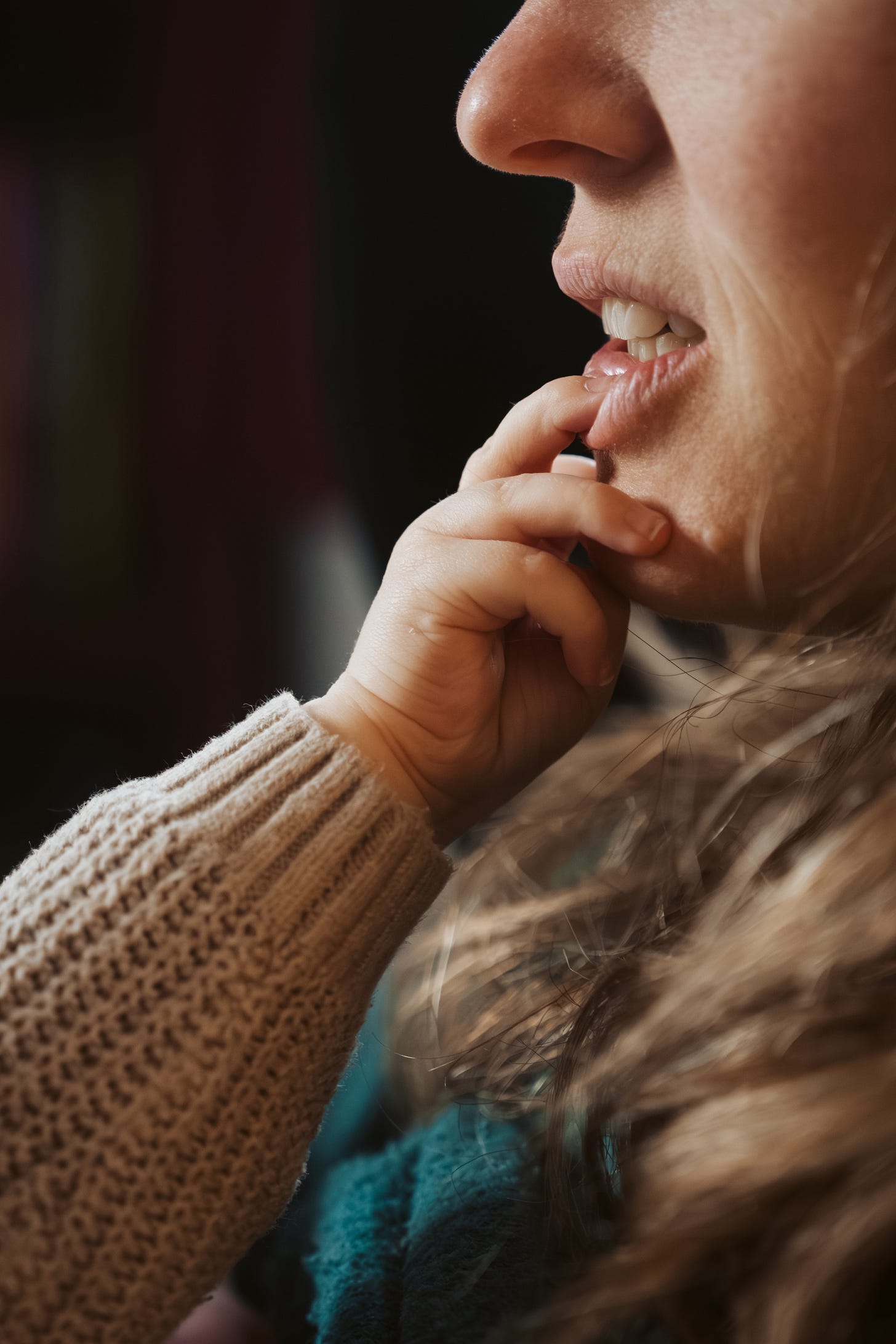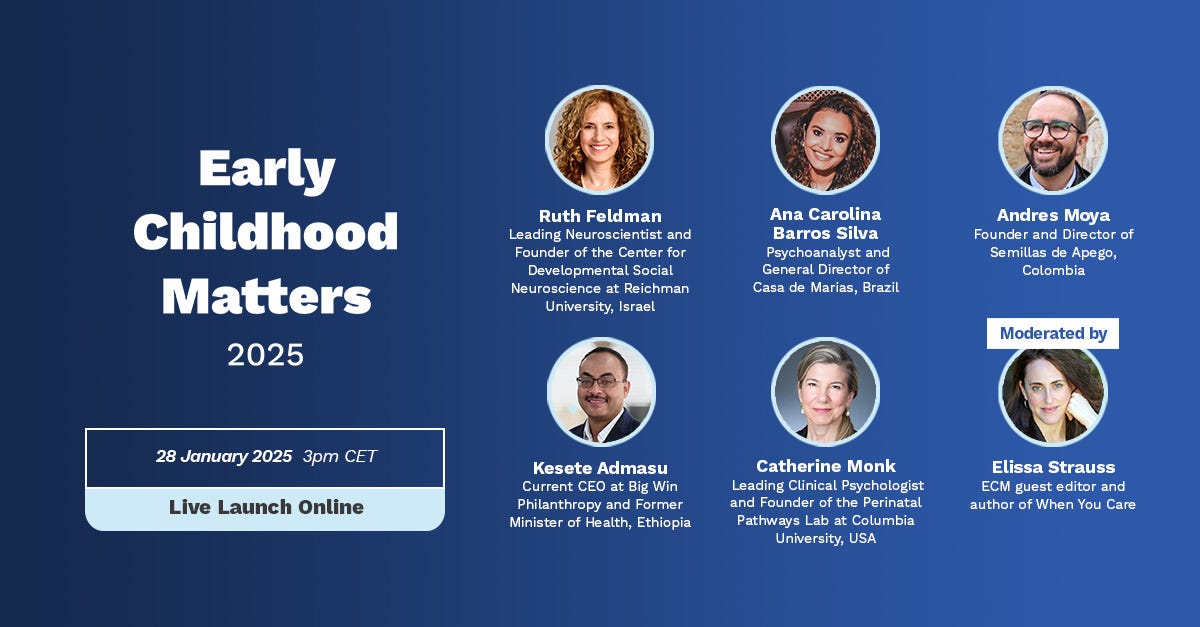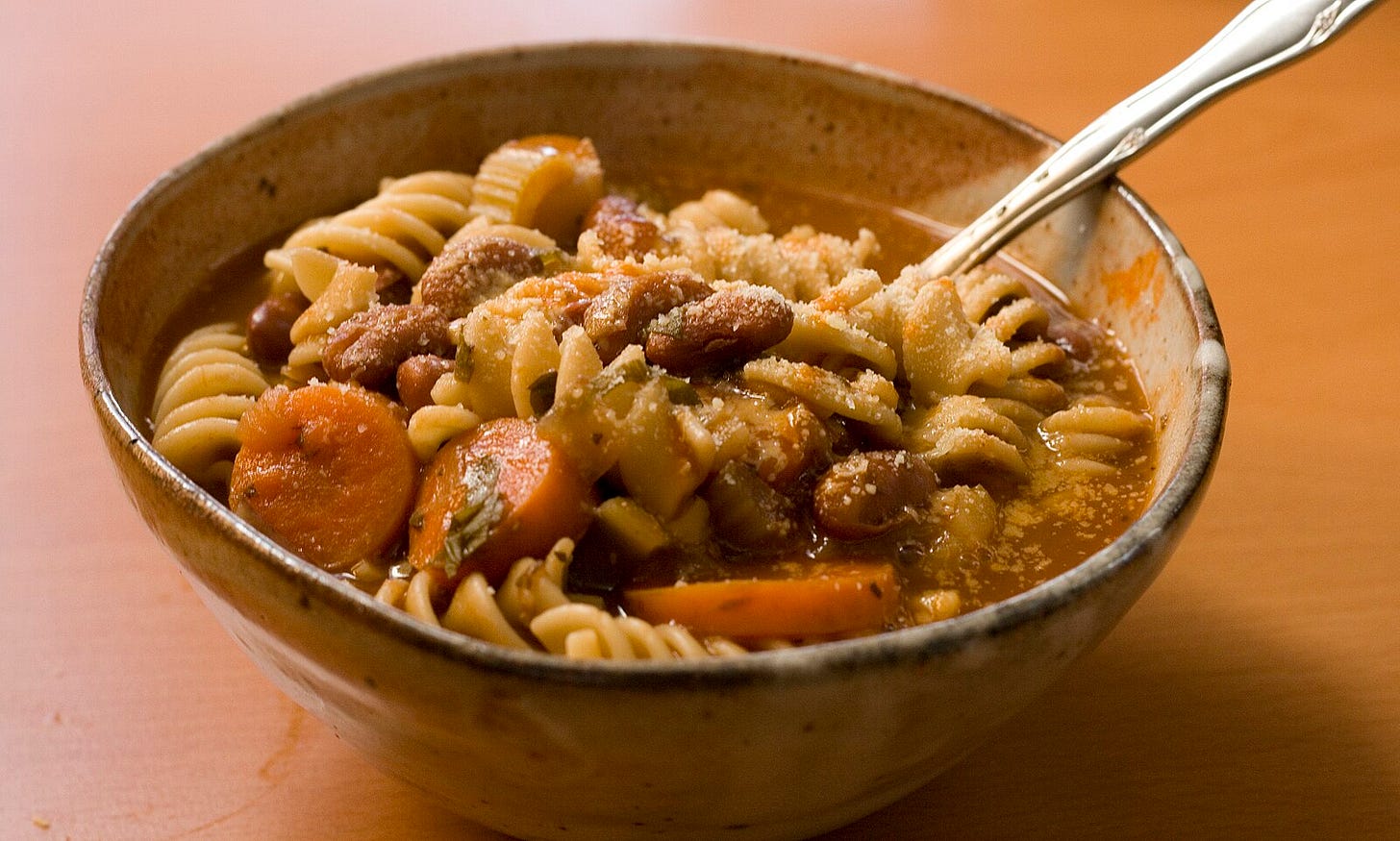50 Reasons to Feel Some Hope
Say hello to "Early Childhood Matters" 2025 -- a roadmap to parental well-being
Thanks for reading and subscribing to “Made With Care,” a deep dive into the cultural roots of the care crisis. I really care about care and so glad you do too. For more on the subject, check out my new book “When You Care: The Unexpected Magic of Caring for Others.”
(Hot tip: Barnes & Noble is having it’s annual nonfiction sale and my book is currently half-off — so if you want to buy it for a good price but not from Jeff Bezos, this is your moment.)
Early last summer, I got an invitation from the Van Leer Foundation to be the guest editor of this year’s edition of their journal, “Early Childhood Matters.” (Follow them on Substack here — they will be rolling out content soon.)
The foundation, which is based in the Netherlands, has been publishing this journal annually since 1998. In it, there is writing from a mix of scientists, urban planners, and healthcare workers alongside novelists, activists and more, all focused on the subject of making life better for families with young children. The foundation also supports on-the-ground initiatives to support this population.
During it’s history, the journal has focused on interventions and ideas directly aimed at young children. But beginning last year, they decided to dedicate two editions focused exclusively on interventions directly aimed at making life better for parents and caregivers to young children.
As any of you familiar with my book know, I believe one of the biggest lies we are told—and tell ourselves—about taking care of others is that it is something we can do on our own. No way! Becoming a parent, or any type of caregiver, means that you, too, need care.
As a cultural critic, it’s my job to think about and write about things. I’m a describer. I offer diagnoses. I put the spotlight on a societal problem or unspoken feeling and say, “There! That! It isn’t working!” It’s meaningful work, that I both like and feel well-suited to do.
That said, sometimes it can feel really good to spend some time with the doers, the ones who take these diagnoses and figure out what actually needs to happen to actually make life better for all those parents and caregivers who feel uncared for.
This particular moment in history, when things feel as dark as they do uncertain, is definitely one of those times.
This journal is filled with such doers, 50 of them in fact, including those who are reimagining postpartum anxiety and depression therapy to be less judgmental and more effective; those who understand the power of creating more places for children to play and parents to socialize around the city; those who are leading the effort to understand the brain science of early parenthood; and those who believe political activism and trauma therapy should center parents/caregivers and their children.
If you want to learn more about “Early Childhood Matters,” you can sign-up for the launch event here, which will take place January 28 at 3 pm CET/ 9 am EST. (If it is early in the morning for you, then go ahead and register and you will be sent a recording after it’s done.)
You can subscribe to receive the whole journal, which will be released on the same day, here.
Below is a sneak peak to this year’s ECM. It’s my introductory essay, in which I share a sincerely life-changing moment when a waitress who I knew nothing about held my small baby so I could eat soup.
(P.S. It is in British English, like the rest of the journal.)
“When She Carried My Baby, She Carried Me Too”
I had never met this woman before, nor did I have any idea if she knew how to safely hold a baby who was just inching out of his sack-of-potatoes phase. Reader, I said yes. Yes! Without asking her a single question.
One cold January day, I decided to go out for lunch with my son Augie.
Just three-months-old at the time, I packed his diaper bag and coerced his little limbs into his warmest bunting, and then pushed him five blocks to an Italian place that was generally quiet during the day. After three monotonous months eating every meal in our apartment, I longed for new views, higher ceilings, and hot food prepared by someone else, and was willing to take the gamble of leaving home with a tiny, unpredictable human for the chance of experiencing any of them.
We made it there quickly, the Brooklyn winds pushing the door behind us shut as the waitress informed me that I could sit wherever I wanted. The place was, as I predicted, nearly empty.
I chose a seat by the window and gave Augie the view -- watching passersby would, I hope, entertain him enough to give me a chance to actually enjoy my lunch, making this slightly extravagant outing worth it. Five minutes later the waitress put down a steaming bowl of minestrone soup and then, in addition to the more expected offering of parmesan cheese, asked me if I would like her to carry Augie around so I could eat.
I had never met this woman before, nor did I have any idea if she knew how to safely hold a baby who was just inching out of his sack-of-potatoes phase. Reader, I said yes. Yes! Without asking her a single question.
Up until that moment I had felt deeply alone as a parent. I was isolated because of structural issues, like my husband’s lack of paternity leave. After a quick five days post-birth he was back at work, leaving me to navigate first-time parenthood on my own. Also, post-delivery, I went from Obstetric care during which people were regularly interested in me, straight to pediatric care in which the only concern was my child’s well-being. I don’t think the pediatrician ever bothered to learn my name. The deepest feelings of alienation came from those who were supposed to support me but only made me feel inadequate, like the lactation consultants who put my child’s alleged need for exclusive breast milk high above my need for sleep.
So when that waitress asked to hold Augie it not only allowed me, a new parent, to sit and eat an entire bowl of hot soup but also opened up a world of possibilities in which new parents can and should be supported by others. Until then, I had unconsciously taken my loneliness, isolation and second-fiddle status to my baby as inevitable.
The sense of possibility I felt that day can be felt by every piece in this year’s Early Childhood Matters. All of the authors and interviewees are working towards a world in which caregivers are seen as worthy of attention and support rather than a means to an end. They understand that such care for mothers, fathers and other caregivers benefits not just the whole family system, but society overall.
In these pages you will read about the latest research on the parental brain, as seen in the work of Ruth Feldman and Darby Saxbe, done with the goal of helping parents better adjust to parenthood. You’ll learn about programmes in countries like India and the United Arab Emirates, which are making cities more caregiver and child-friendly, and strengthening community ties. You’ll also learn about a new generation of trauma specialists and peace activists who put the reality of life as a caregiver to young children front-and-center in their work.
Together, these essays, articles and interviews are filled with plans and visions, a mix of practical suggestions and bold possibilities, all in service of a better future for parents, and the kids they take care of.
After Augie and I got home that afternoon we did our regular pre-nap ritual, which involved me putting him on a colorful mat and making funny faces and noises while shaking baby toys. This time, my gaze was less distracted, and my voice was a little softer, thanks to the waitress. By caring for me, by giving me a well-earned break, she had expanded my capacity to care for him. As I put him in his crib and drew the curtains, I began to question, really for the first time, why I didn’t expect more care as a caregiver, what care I needed, and how I would get it.
By caring for me, by giving me a well-earned break, she had expanded my capacity to care for him. As I put him in his crib and drew the curtains, I began to question, really for the first time, why I didn’t expect more care as a caregiver, what care I needed, and how I would get it.
Care, I realised, is so often thought of as something that takes place between two people, the person giving the care, and the person receiving the care. But that day I understood, intellectually and emotionally, that care is far too challenging and rich to be a two-person game. No, we shouldn’t be caring in pairs, but in concentric circles, Russian Nesting Dolls of care, in which each person caring for another has people and communities who care for them, layers and layers of care that connect us all.
The good news? As the contributors to this journal make clear, we know what we need to do to build such a world. It’s time to make it happen.
Thanks for reading and subscribing to “Made With Care,” a deep dive into the cultural roots of the care crisis. I really care about care and so glad you do too. For more on the subject, check out my new book “When You Care: The Unexpected Magic of Caring for Others.”







Love the "Russian nesting dolls of care" analogy!
I finally got around to reading a few of these essays and honestly had to stop because I need to look presentable in an hour or so;) Such needed work - all the emotion over here! Brava!